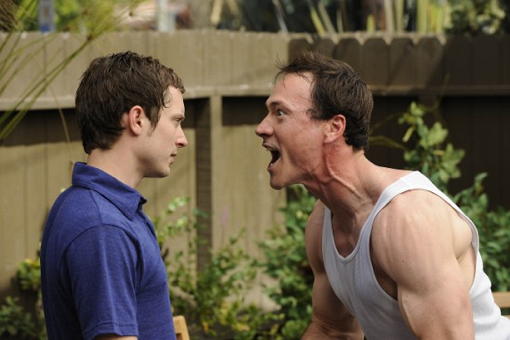By Matt Meier · August 1, 2011

"Conscience is the dog that can't bite, but never stops barking." – Proverb
The sixth episode of Wilfred brings back Chris Klein (who has apparently been enjoying a diet of raw eggs, chicken breast smoothies, and pumping serious iron) as Drew, Jenna’s boyfriend. It’s the typical douchey Bro role that has become a platitude of comedy over the past decade mainly due to the increasing frequency with which he appears in the real world; but Wilfred approaches the character with a certain self-awareness of the familiarity of the role:
Wilfred: “Here comes the corny nickname.”
Drew: “See you then, Ry-guy.”
Wilfred: “And here comes the part where he carries her into the house like a Viking on a rape quest.”
Drew grabs Jenna and throws her over his shoulder, carrying her into the house as she playfully shouts.
It’s the classic right-girl-with-the-wrong-guy storyline we’ve seen so many times before, but Ryan doesn’t want to play. He sees how happy Jenna is with Drew, and he wants to be the better man and just let them be: if the tool-bag Sheboygan Lager salesman makes Jenna happy, then he’ll back off. Wilfred, on the other hand, wants St. Broseph out of town, and as usual, he successfully manages to get Ryan to see things his way. So, exploiting Bro J. Simpson’s weakness for competitive sports, a major source of tension in his relationship with Jenna, Ryan challenges Broba Fett to a ping-pong match and successfully provokes him to freak out, prompting Jenna to dump him. So Ryan, feeling guilty, tries to get them back together, while Wilfred, feeling betrayed, tries to teach Ryan a lesson by poisoning him with chocolate. Etcetera, Etcetera…
The episode provides some decent jokes as always, but I find myself becoming increasingly frustrated. I’m starting to get the sense that the writers have far less an understanding of what they’re trying to accomplish than I initially hoped. It’s as if the writing room completely resets every week, just taking blind shots in the dark and hoping they hit something.
A few of the episodes have been definite successes. The premiere (“Happiness”) was probably one of their more-well crafted episodes, neatly blending the cynical with the absurd. But then we endured two relatively forgettable episodes 2 & 3 (“Trust” and “Fear”) before arriving at something entirely goofy and grotesque (Episode 4: “Acceptance”). Last week I thought they had regained their stride with Episode 5: “Respect”; but once again, the series threw away all they accomplished, tossing us some disappointingly stale oatmeal comedy.
Watching Wilfred is like watching a weekly identity crisis, the likes of which we haven’t seen since Larry became Lana Wachowski.
Consistency is always difficult in this industry, especially when a different writer heads almost every episode. But it seems to me that the show has little to no concept of what it hopes to achieve, and every time it comes close it tosses the blue print and starts from scratch. The dog jokes will always have a certain charm to them, but every show needs some type of arc in its protagonist, and the biggest problem is that Wilfred completed that arc in the very first episode:
Six episodes ago, Ryan tried to kill himself.
But that existential crisis was resolved in that same episode, and we’ve barely returned to it since. I’m not saying that Wilfred needs some type of storyline that carries through from episode to episode; but if they’re not going to do this, then they at least need to find some type of original formula they can follow week in and week out without growing stale. South Park found their formula, and they’ve been on the air for fifteen seasons. The Office did the same (only with slightly more narrative cohesion from one episode to the next), and they’ll be entering their eighth season this fall without Michael Scott, who seemingly formed the backbone of that show for all that time.
For Wilfred, they need to find their hook and stick with it. Wilfred will always be funny, and should always form the comedic foundation of each episode. But we need a reason to care about Ryan, and I’m not sure what that reason is anymore. Wilfred is far too quirky and unique a premise to rely on otherwise ordinary plotlines, and you’d think that a character who hallucinates a talking dog and tried to commit suicide six weeks ago would be more compelling than a box of Raisin Bran.
The more risks that Wilfred takes, the better the chance they have for future success. Figuratively speaking, the show needs less vanilla and more chocolate, and ironically, the thing that usually kills most dogs could end up saving this one.